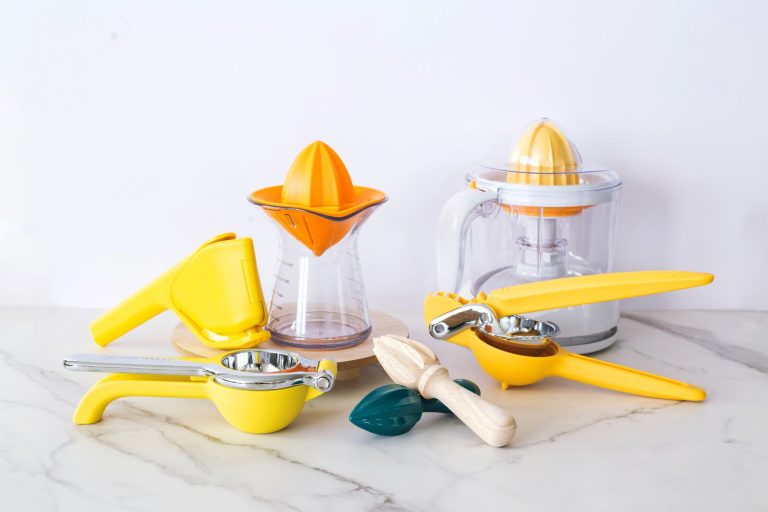Imagine waking up on a lazy Sunday morning. You’re ready to enjoy a refreshing glass of citrus juice.
But there’s a choice to make: manual or electric juicer? Each option has its unique benefits and drawbacks. You might be wondering which one will give you the best flavor, ease of use, and efficiency. You’re not alone in this dilemma.
Many find themselves torn between the simplicity of manual juicers and the speed of electric ones. This article is here to help you navigate the pros and cons of each type, so you can make the best choice for your kitchen and lifestyle. Let’s dive in and explore the juicy details together!
:max_bytes(150000):strip_icc()/sea-chefn-kitchenaid-citrus-juicers-cindy-rahe-primary-73e399b7fdc044119970269cc1b4373e.jpeg)
Credit: www.seriouseats.com
Manual Citrus Juicers
If you’re a fan of fresh citrus juice to kickstart your day, you’ve probably wondered about the best tools for the job. Manual citrus juicers have been a kitchen staple for years, offering simplicity and control. But how do they stack up against their electric counterparts? Let’s dive into the world of manual citrus juicers and see what they bring to the table.
Features And Design
Manual citrus juicers come in various forms, from the classic handheld reamer to the more advanced lever-style press. Each has its charm and functionality. The handheld reamer, often made of wood or plastic, is compact and straightforward. You twist it into the fruit and let the juice flow. On the other hand, lever-style presses provide more pressure and are ideal for squeezing every drop out of your citrus. They feature a sturdy base and a lever that you pull down to extract the juice.
Have you ever tried a handheld reamer and felt like you were getting a mini workout? That’s part of the charm! These tools are lightweight, easy to clean, and don’t require electricity. Plus, their compact size makes them easy to store.
Advantages Of Manual Juicers
One of the standout benefits of manual juicers is their portability. No need for a power outlet—take them on a picnic or camping trip for fresh juice wherever you are. They are also budget-friendly, making them accessible to everyone. If you’re looking to save money and space, manual juicers are a solid choice.
Using a manual juicer can be therapeutic. There’s something satisfying about squeezing the juice out of a fresh orange with your hands. It connects you to the process and the fruit itself. Have you ever felt like you’re missing out on something by relying on machines? Manual juicers bring back the simplicity and authenticity of juice making.
Limitations Of Manual Juicers
While manual juicers have their perks, they also come with limitations. Extracting juice manually can be labor-intensive, especially if you’re juicing large quantities. Your hand might get tired after just a few fruits. Additionally, manual juicers might not extract as much juice as electric ones, leaving you with leftover pulp.
Are you someone who appreciates efficiency and speed? Manual juicers might test your patience. They require effort and time, which might not suit everyone’s busy lifestyle. And let’s face it, cleaning can sometimes be a hassle, especially if the juice gets sticky.
So, where do you stand on manual citrus juicers? Are they a charming addition to your kitchen routine or a relic of the past? Consider your lifestyle, preferences, and needs when choosing the right tool for your citrus juicing adventures.
Electric Citrus Juicers
Electric citrus juicers offer a convenient way to extract juice from citrus fruits. They are popular among those who value speed and efficiency in their kitchen gadgets. With a simple press of a button, they can deliver fresh juice in seconds. Electric juicers come in various models, each boasting unique features and designs.
Features And Design
Electric citrus juicers often have a sleek and modern design. Most models include a powerful motor for effortless juicing. They come with different size cones for various fruit sizes. Many have a pulp control feature, allowing users to choose their preferred pulp level. Some models even include a juice container with measurement markings. Easy-to-clean components make them user-friendly.
Advantages Of Electric Juicers
Electric juicers save time by quickly extracting juice. They require less manual effort compared to manual juicers. Perfect for those who juice large quantities regularly. They produce consistent juice quality with minimal effort. Many models are compact and fit easily on kitchen counters.
Limitations Of Electric Juicers
Electric juicers can be more expensive than manual ones. Their motor noise may disturb quiet environments. They need an electrical outlet, limiting their use outdoors. Some models may have more parts, complicating cleaning. They occupy more storage space than manual juicers.
Comparative Analysis
Choosing between manual and electric citrus juicers involves weighing convenience and efficiency. Manual juicers offer simplicity and cost-effectiveness, ideal for occasional use. Electric juicers provide speed and ease, perfect for frequent juicing but often come with higher costs and maintenance needs.
Consider usage frequency and budget to determine the best fit.
In the realm of citrus juicers, a comparison between manual and electric types helps users make informed choices. Each type offers unique benefits and potential drawbacks. Understanding these can guide you to the perfect juicer for your needs. This analysis will focus on efficiency, ease of use, and cleaning aspects.Efficiency And Speed
Manual juicers require physical effort. They extract juice slowly. This method allows better control over the process. You can enjoy every drop of juice. But it can be tiring for large quantities. Electric juicers work faster. They save time and energy. These machines extract juice in seconds. They are ideal for busy mornings. But they may produce slightly more foam. This affects juice texture.Ease Of Use
Manual juicers have a simple design. They are easy to handle. This simplicity makes them accessible to everyone. You only need hand strength and a little patience. Electric juicers need a power source. They have more parts and buttons. This can be confusing for some users. Yet, once set up, they operate with minimal effort. Just press a button and let the machine work.Cleaning And Maintenance
Manual juicers have fewer parts. This makes cleaning straightforward. You can rinse them under water. They require less maintenance over time. Electric juicers have more components. Cleaning them takes more time. Some parts are dishwasher-safe. Others need careful hand washing. Regular maintenance ensures longevity. Dust and residue can affect performance.Cost Considerations
Choosing between manual and electric citrus juicers involves considering costs. Different factors affect the cost, from the initial purchase to long-term expenses. Understanding these can help make an informed decision. Let’s explore these cost considerations.
Initial Investment
Manual juicers usually cost less upfront. They are simple devices with fewer parts. This makes them more affordable for budget-conscious buyers. Electric juicers typically require a higher initial investment. Their advanced features and motorized parts add to the price. Consider your budget when deciding.
Long-term Value
Manual juicers have fewer maintenance costs. They are easy to clean and rarely need repairs. This can save money over time. Electric juicers might incur more expenses. Regular maintenance and potential repairs add to long-term costs. Evaluate how often you’ll use the juicer. Consider the convenience and speed of electric models. Weigh these factors against ongoing costs.
Choosing Based On Lifestyle
When deciding between manual and electric citrus juicers, considering your lifestyle can make all the difference. Each type of juicer comes with its own set of advantages and disadvantages, tailored to different usage patterns. Whether you’re someone who enjoys the occasional glass of fresh juice or a daily juicing enthusiast, there’s a juicer out there for you. Let’s delve into how your lifestyle impacts your choice.
For Casual Users
If you’re the type who enjoys a refreshing glass of citrus juice now and then, a manual juicer could be your best friend. Picture this: you’re hosting a weekend brunch and decide to whip up some fresh orange juice. A manual juicer is perfect for such occasions. It’s compact, easy to use, and doesn’t require any setup or electricity.
Manual juicers are often lightweight and easy to store, making them ideal for limited kitchen space. They also offer more control over the juicing process. You can adjust the pressure and speed, ensuring you get every drop from your fruit. However, they do require a bit of elbow grease. If you’re okay with a little manual effort, these juicers can be quite satisfying.
Ask yourself: Do you value simplicity and control over convenience? If the answer is yes, then manual juicers can be an excellent choice for your casual juicing needs.
For Frequent Juicers
Are you a frequent juicer, someone who starts their day with a glass of citrus goodness? If so, an electric juicer might be what you need. Imagine waking up each morning and having your juice ready in minutes without much effort. Electric juicers offer speed and efficiency, which is crucial for busy mornings.
These juicers come equipped with powerful motors that can extract juice quickly, saving you time. They handle large quantities effortlessly, making them suitable for families or individuals who juice regularly. However, they do take up more counter space and need electricity to operate, which could be a consideration for some.
Consider your daily routine: Is speed and convenience a priority for you? If so, investing in an electric juicer could transform your juicing experience, making it seamless and enjoyable.
Ultimately, your juicer choice should align with how often you juice and the level of convenience you desire. Weigh the pros and cons against your lifestyle needs to find the perfect fit. So, what’s your juicing style? Casual or frequent? The right juicer awaits!
Environmental Impact
Citrus juicers play a significant role in the kitchen. Their environmental impact is an important consideration. Choosing between manual and electric models affects the planet differently. Understanding these impacts helps make informed choices. Let’s explore the environmental aspects of each type.
Energy Consumption
Electric juicers need electricity to function. This increases energy consumption. More energy means a larger carbon footprint. Manual juicers rely solely on human effort. They don’t use electricity. This results in lower energy usage. Choosing manual may lessen environmental harm.
Material Sustainability
Many manual juicers use sustainable materials. Stainless steel, wood, and glass are common. These materials are often recyclable. Electric juicers sometimes use plastic. Plastic can be less environmentally friendly. It may not decompose easily. Consider material sustainability when choosing.
Popular Brands And Models
Choosing the right citrus juicer can be tricky. Manual and electric juicers both have their merits. Popular brands offer various models. Each with unique features and designs. Understanding these brands helps make an informed decision.
Breville Citrus Juicers
Breville is known for durable kitchen appliances. Their electric citrus juicers stand out. Users appreciate their efficiency and sleek design. The Breville 800CPXL is a popular choice. It features a powerful motor and stainless-steel body. It ensures a fast and smooth juicing experience.
Cuisinart Citrus Juicers
Cuisinart offers both manual and electric options. Their products are user-friendly and reliable. The Cuisinart CCJ-500 is a favorite. It has an adjustable reamer and auto-reversing cone. These features maximize juice extraction.
Zulay Kitchen Citrus Juicers
Zulay Kitchen specializes in manual citrus juicers. Their products are affordable and effective. The Zulay Professional Citrus Juicer is well-loved. It is sturdy and easy to clean. Perfect for those who enjoy hands-on juicing.
Black+decker Citrus Juicers
Black+Decker offers budget-friendly electric juicers. They are compact and efficient. The Black+Decker CJ625 is a top model. It has a dual-purpose cone and adjustable pulp control. Ideal for those who want control over their juice consistency.
Hamilton Beach Citrus Juicers
Hamilton Beach provides versatile juicers. Their products cater to different needs. The Hamilton Beach 932 is a standout. It is a manual juicer with a classic design. Known for its durability and ease of use.
Tribest Citrus Juicers
Tribest focuses on health-oriented kitchen tools. Their juicers are efficient and eco-friendly. The Tribest CitriStar CS-1000 is popular. It offers a powerful motor and quiet operation. Great for health-conscious individuals.

Credit: www.amazon.com

Credit: www.amazon.com
Frequently Asked Questions
Is A Manual Or Electric Juicer Better?
Choosing between manual and electric juicers depends on your needs. Manual juicers are portable and easy to clean. Electric juicers offer speed and efficiency for larger quantities. Consider your budget, usage, and convenience to decide which fits your lifestyle best.
What Is The Best Way To Extract Juice From Citrus Fruits?
Use a citrus juicer or reamer to extract juice efficiently. Cut fruit in half, press, and twist. Electric juicers speed up the process, ensuring maximum juice yield. Hand-held reamers are portable and affordable. Strain juice to remove pulp and seeds for a smooth consistency.
What Is The Disadvantage Of A Juicer Machine?
Juicer machines can be expensive and difficult to clean. Nutrient loss occurs as fiber is removed. They can be noisy and may produce heat, affecting juice quality. Some models have limited functionality, only extracting juice from certain fruits and vegetables.
Consider these factors before purchasing a juicer.
What Is The Difference Between A Citrus Juicer And A Regular Juicer?
A citrus juicer extracts juice specifically from citrus fruits like oranges. A regular juicer extracts juice from various fruits and vegetables. Citrus juicers are simpler and usually manually operated. Regular juicers are versatile and often electric, suitable for larger quantities and different produce.
Conclusion
Choosing between manual and electric citrus juicers depends on your needs. Manual juicers are simple and cost-effective. Easy to clean, too. Electric juicers save time and require less effort. They handle large quantities well. Consider your budget and kitchen space.
Think about how often you juice. Both types have their own pros and cons. Analyze what suits your lifestyle best. Whether you prefer manual or electric, enjoy fresh juice every day. Happy juicing!


